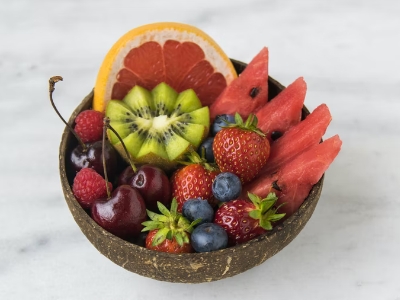Most Nutritious Fruits
Health experts know that fruits are a highly nutritious, delicious, and convenient addition to any diet. With more than 2,000 varieties of fruit available, you may wonder which one you must pick.
Each type of fruit brings its own unique set of nutrients to the table. The key is to eat fruits of various colors, as each provides a different set of healthy nutrients.
Here are the Nutritious Fruits You may Enjoy Regularly:
1. Apple
Apple is one of the most popular fruits because it is full of nutrition. They’re rich in soluble and insoluble fiber that helps manage your blood sugar levels, promotes good digestion, and supports heart and gut health.
2. Blueberries

Blueberries are known for their antioxidant and anti-inflammatory properties. The compound that this fruit has helps fight cell-damaging free radicals that can lead to disease.
3. Bananas
Bananas contain magnesium and vitamins B6 and C. It also contains a wide variety of plant compounds called phytosterols and polyphenols, both support overall health. In addition, ripe bananas are an excellent source of easily digested carbs which makes them great to fuel up on before a workout.
4. Oranges
Orange is known to have a high vitamin C content. This fruit is also contains high in thiamine, folate, potassium, plant polyphenols, and fiber. Studies have shown that consuming whole oranges may lower cholesterol, inflammation, blood pressure, and post-meal blood sugar.
5. Dragon fruit
Dragon fruit is rich in many nutrients including magnesium, iron, and fiber.
6. Mango
Mango is an excellent source of folate, potassium, fiber, and vitamins A, C, B6, E, and K. This fruit also have antioxidant and anti-inflammatory properties.
7. Avocado
Avocados are high in healthy fats and low in natural sugars. These fruits help with heart health and support eye health.
8. Pineapple
Pineapple is known to be one of the most popular tropical fruits. It has antioxidant and anti-inflammatory properties. Pineapple also has an enzyme. Anecdotal sources also claim this enzyme may support digestion, though there’s limited research on this.
9. Strawberries
Strawberries are a favorite fruit for many. These fruits are convenient and delicious as well as nutritious. Strawberries are a good source of folate, vitamin C, and manganese.
10. Watermelon
Watermelon is a highly nutritious summer favorite. This fruit is an abundant source of antioxidants. Watermelon is also a good source of magnesium and potassium.
11. Kiwi
Kiwi is also known as Chinese gooseberry. This fruit is great for your health as it is high in vitamin C and a good source of vitamin E, folate, and fiber.
12. Grapes
Grapes are convenient, healthy, and particularly high in potassium and vitamin K, supporting heart health. They’re a rich source of beneficial plant compounds that have been linked to numerous health benefits, such as a lowered risk of heart disease and certain types of cancer.
Types of Nutrients and Their Sources
A healthy balanced diet consists of the right amount of nutrients that the body needs to function well. The body of a person is a machine and the food is the fuel.
A person needs to consume all the types of nutrients to ensure the best possible health. These nutrients support vital functions including growth, the immune the central nervous system, and preventing disease.
The Essential Types Of Nutrients Are:
1. Minerals
Minerals are the second type of micronutrients. There are two groups of minerals known as major and trace minerals. The body needs a balance of minerals from both groups for optimal health.
Major minerals are:
- Chloride
- Potassium
- Sodium
- Sulfur
- Phosphorus
- Calcium
- Magnesium
Trace minerals are:
- Molybdenum
- Fluoride
- Iodine
- Copper
- Chromium
- Manganese
- Zinc
- Selenium
- Iron

You may get these nutrients on:
- Beans and legumes
- Whole grains
- Egg yolks
- Fortified bread and cereals
- Poultry
- Fruits
- Leafy greens
- Vegetables
- Nuts and seeds
- Milk and other dairy products
- Iodized table salt
- Seafood
- Red meats
2. Vitamins
Vitamins offer a range of health benefits including:
- Aiding brain and nervous system functioning as well as calcium absorption
- Supporting healthy blood
- Helping the body metabolize carbs and proteins
- Maintain healthy skin
- Strengthening bones and teeth
- Helping prevent or delay certain cancers
- Boosting immune system
Typically, an individual who eats a diet rich in fruits, vegetables, and lean proteins can get all the vitamins needed in their food. On the other hand, those who eat fewer vegetables and fruits, and those with digestive conditions may need to take a vitamin supplement to lessen or avoid a deficiency.
3. Fats
People often link high-fat foods with bad health. Conversely, a person needs certain fats to help maintain optimal health. Fats give the body energy and help it carry out a range of functions. You can find healthful fats in several foods including:
- Seeds
- Vegetable oils
- Nuts
- Fish such as tuna and salmon
4. Protein
Protein is a micronutrient that each cell in the body needs to function well. It helps with the growth and development of bones, hair, muscles, and skin. It also serves as a fuel source for cells and tissues when needed.
The following foods are good sources of protein:
- Nuts
- Soy
- Dairy products
- Eggs
- Beans and legumes
- Fish and other seafood
- Poultry
- Red meats
- Some grains including quinoa
5. Carbohydrates
Carbohydrates are needed for the body. These are sugars and starches that give energy to all the cells and tissues in the body. Carbohydrates support the following:
- Digestive function
- Energy to perform the task
- The nervous system and immune system
- Brain function
The following foods have carbohydrates:
- Barely
- Fruits
- Oatmeal
- Whole grain pasta and bread
- Vegetables
- Brown rice
- Quinoa
6. Water
Water is the most important nutrient needed. The human body is made up of mostly water. Each cell needs water to function. Water helps with several functions:
- Hydration
- Preventing constipation
- Transporting nutrients
- Shock absorption
- Flushing toxins out
The best source for water is to drink natural, unsweetened water from tap or bottled sources. Also, you can get extra water by consuming fruits that have a large amount of water.




